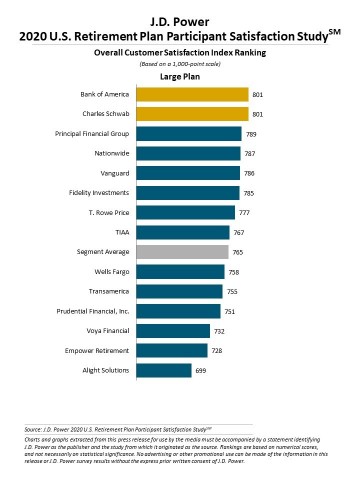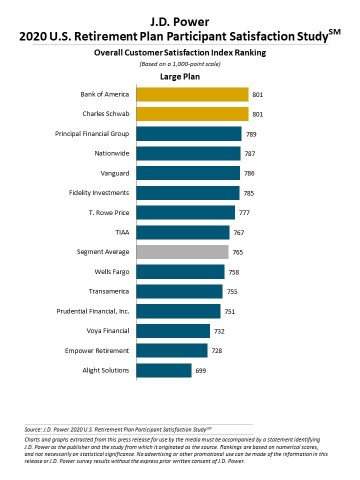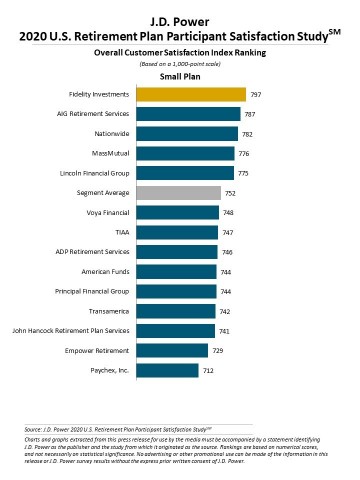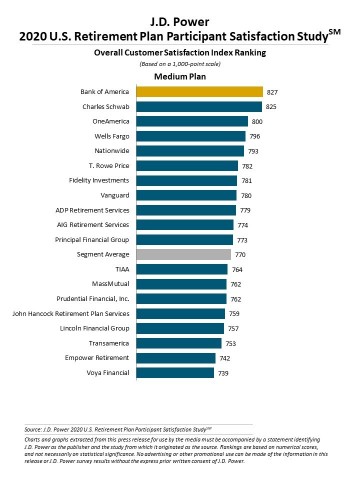TROY, Mich.--(BUSINESS WIRE)--There has never been a more challenging time to invest for retirement. A combination of unprecedented market volatility and complex new rules involving contributions, withdrawals and tax implications have exposed a need for increased guidance and advice on the part of retirement plan providers. Additionally, with record job losses in recent months, much of the money accumulated in these plans may potentially be lost if participants choose another provider for a rollover. According to the J.D. Power 2020 U.S. Retirement Plan Participant Satisfaction Study,SM released today, few providers are successfully addressing this growing need.
“The COVID-19 pandemic struck the U.S. right in the middle of the fielding period for this study, and it is crystal clear in our data that, as market turmoil increased, investor sentiment and economic outlook declined sharply,” said Mike Foy, senior director of wealth management intelligence at J.D. Power. “This left many retirement plan participants searching for answers and guidance that was simply not provided by their provider. At this critical time, plan providers are largely failing to provide the guidance needed by participants to make smart decisions to help them prepare for retirement.”
Following are some key findings of the 2020 study:
- Retirement investors not receiving advice: Just 27% of retirement plan participants say they have accessed professional financial advice related to their plan, and 29% are either unaware of whether such advice is available or perceive that it is not available to them.
- Low engagement with providers erodes satisfaction: Nearly one-fourth (22%) of retirement plan participants say they’ve had no interaction with their provider during the past 12 months. This is a problem for providers because frequency of interaction is directly correlated to participant satisfaction. Overall satisfaction scores increase 44 points (on a 1,000-point scale) when participants say they’ve had one to four interactions per year with their retirement plan provider. Satisfaction scores increase by 99 points when participants engage 21 or more times per year with their retirement plan provider.
- Investor satisfaction linked to roll-in and rollover retention: Increased levels of unemployment and employment turnover will drive a surge in roll-in and rollover decisions during the coming weeks and months. Among participants who say they are “delighted” with their retirement plan provider, 51% say they “definitely will” retain assets in their current plan. That percentage falls to just 12% when participants who say they are “indifferent” with their plan and to 7% among those who are “dissatisfied.”
- Personalized digital communication can help, but few plans delivering: Proactive, personalized digital communications can have a positive effect on participant satisfaction. For example, communication satisfaction scores are 70 points higher when participants receive a personal communication via their retirement plan provider’s mobile app than when they receive a traditional email. However, just 15% of retirement plan participants indicate having received this type of digital communication.
“It’s impossible to overstate the financial implications for firms that get the participant satisfaction formula right during this make-or-break moment,” Foy added. “Historically, some plan providers have been focused only on the plan sponsor and, while that is changing somewhat, firms need to be laser focused on participants as well.”
Study Rankings
In the large plan segment, Bank of America and Charles Schwab rank highest in a tie, each with a score of 801. Principal Financial Group (789) ranks third.
In the medium plan segment, Bank of America ranks highest with a score of 827. Charles Schwab (825) ranks second and OneAmerica (800) ranks third.
In the small plan segment, Fidelity Investments ranks highest with a score of 797. AIG Retirement Services (787) ranks second and Nationwide (782) ranks third.
The U.S. Retirement Plan Participant Satisfaction Study, now in its third year, evaluates participant satisfaction with providers of group retirement plans, such as 401(k)s, based on six factors: interaction across live and digital channels; investment and service offerings; fees and expenses; plan features; information resources; and communications. Plan providers are ranked in three categories based on their overall mix of business in terms of average plan size. The study is based on responses of 10,159 retirement plan participants and was fielded in February-March 2020.
For more information about the U.S. Retirement Plan Participant Satisfaction Study, visit https://www.jdpower.com/business/resource/us-group-retirement-satisfaction-study.
To view the online press release, please visit http://www.jdpower.com/pr-id/2020067.
J.D. Power is a global leader in consumer insights, advisory services and data and analytics. These capabilities enable J.D. Power to help its clients drive customer satisfaction, growth and profitability. Established in 1968, J.D. Power has offices serving North America, Asia Pacific and Europe.
About J.D. Power and Advertising/Promotional Rules: www.jdpower.com/business/about-us/press-release-info






